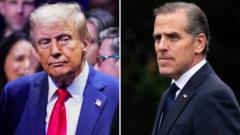The legal predicaments of President Joe Biden and former President Donald Trump may seem worlds apart, yet the recent developments in their cases invite unexpected comparisons—particularly regarding their responses to serious legal challenges. On Sunday night, President Biden issued a “full and unconditional” pardon for his son Hunter, asserting that he was unfairly prosecuted for being the president's child. “No reasonable person who looks at the facts of Hunter’s cases can conclude otherwise than that he was singled out because he is my son – and that is wrong,” he declared.
Biden's assertions breathe life into criticisms that resonate with those voiced by Trump, especially concerning Trump’s own indictment over hush-money payments related to adult film star Stormy Daniels. This disturbing trend is underscored by Republican Senator Lindsey Graham, a close Trump ally, who labelled the legal proceedings against Trump as “selective prosecution for political purposes.”
Biden's pardon shifts focus to critical elements linking the two cases: they were both brought to light in 2024, and they both feature intricate legal frameworks that have come under scrutiny. Notable is how Trump’s alleged offenses date back to 2016, while Hunter’s legal issues stem from actions taken from 2016 to 2019. Their fates have taken twists and turns with delays and potential plea deals that either collapsed or appeared on the verge of being dropped.
The cases stress innovative applications of existing laws, with Trump’s campaign finance allegations being federal offenses ignored by government attorneys, while Hunter’s gun application and tax returns involved rare prosecutions that would typically evade criminal charges. Trump’s legal representatives have seized on Biden's remarks, using the comparisons to underpin their argument for dismissing the former president's conviction.
Despite these similarities, the two cases diverge significantly. Unlike Trump, who has faced multiple legal challenges for serious alleged crimes, Hunter Biden has not served in public office. Nevertheless, both figures raise questions regarding political bias in judicial actions, with Democrats defending the legitimacy of Trump’s trial while Republicans deem Hunter’s legal outcomes as deserved.
Experts note that claims of prosecutorial bias often miss the more intricate realities of charging decisions. Many laws go unprosecuted, creating a perception of injustice, particularly in high-profile cases involving political figures. This might explain the shared sentiments of injustice both sides promote amidst growing distrust in political institutions.
As Biden exerts presidential powers for his son’s protection and Trump continues to frame his legal woes within the context of political persecution, it becomes evident that both politicians are leveraging their respective situations to engage with the public’s waning trust in government.
The interplay of privilege and the justice system has never been more pronounced, raising significant questions about equity and belief in justice in America. The influence of political narratives, particularly from figures like Trump and Biden, highlights an intense moment in American politics, driven by perceptions of bias and the complexities of legal frameworks.




















